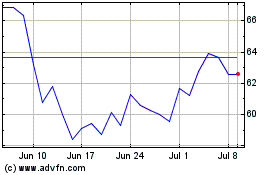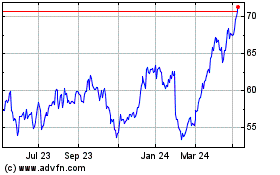Basel Committee Chief Says New Capital Rules Are on Track
October 12 2016 - 12:50PM
Dow Jones News
BRUSSELS—The head of the Basel Committee on Banking Supervision
said Wednesday his organization won't yield to pressures from
European lenders to water down proposed new standards which could
increase capital requirements.
William Coen, Secretary-General of the Swiss-based standards
setter, spoke at the European Parliament on Wednesday and said that
the committee would forge ahead with the controversial plans to
revise postcrisis capital rules which are still under
negotiation.
"We are well on track to complete these reforms by the end of
the year," said Mr. Coen. "The weaknesses in the banking sector
were transmitted to the rest of the financial system and the real
economy…. Nine years after the start of the crisis, the global
economy is still recovering from its effects."
Mr. Coen's appearance in Brussels comes as European Union
officials and the bloc's biggest lenders have scaled up their
warnings about the damage the new bank-safety rules could inflict
on the banking sector.
Europe's largest banks have come out saying the reforms, dubbed
"Basel IV", would impose costly new burdens on banks' finances and
hinder lending at a time when Europe is struggling with growth.
Philippe Bordenave, chief operating officer of France's BNP
Paribas SA stressed in September that current proposals would
increase the overall level of capital requirements "to an extent
that would damage financial stability."
Sylvie Goulard, a French member of the European Parliament,
pointed out that the Basel reforms can no longer be detached from
politics, given Europe's weak economic situation and the delicate
state of its banking sector.
"The mood in the public opinion has changed, and we see it in
the American presidential election and we see it in Europe," said
Ms. Goulard. "What is at stake is much more than financial
stability, it is the stability of our political systems. We need to
explain to voters and citizens where the rules are coming from and
who is doing what."
Ms. Goulard added that Basel's decisions, even though they bear
no legal force, ultimately impact how the banking sector
behaves.
While the Basel Committee introduced fresh rules after the 2008
financial crisis that bolstered the amount of capital banks must
hold to withstand moments of economic crisis, it has since said
tighter rules are required to bolster the framework. The committee
said some banks could still be undercapitalized because of the
varying methods banks use to calculate capital, also known as
"internal models."
To rectify this, the Basel Committee has proposed five different
rules since the end of last year that would require banks to use
industrywide calculations instead of their own when assessing risk.
U.S. regulators argue European banks currently have an advantage
because of their freedom to make risk calculations on their own.
They say this allows European banks to underestimate their capitals
needs.
The plans have provoked fierce reactions on the continent.
Germany and France, whose leading lenders include Deutsche Bank and
BNP Paribas, have been the most outspoken against the proposed
rules.
"It must be clear that this package must be balanced and that it
must provide the same level playing field," said German finance
minister Wolfgang Schä uble on Tuesday at a meeting of EU finance
ministers in Luxembourg. "And that there mustn't be a
discrimination of European banks regarding capital requirements,"
he added.
EU officials and politicians argue the rules would put the
region's banks at a disadvantage to U.S. counterparts because,
unlike American firms, European banks generally hold mortgage loans
on their balance sheets. As a result, they have to offset more
capital against those loans.
Mr. Coen firmly denies that there is a trans-Atlantic spat
unfolding in the Basel Committee. "Let me point out that this isn't
debate between the European Union and the United States" he said.
"There are other countries on the Basel Committee. I don't see this
as a level playing field issue," he told lawmakers.
EU regulators, including the bloc's financial services chief
Valdis Dombrovskis, have spoken out against the plan though,
specifically citing the risk of a competitive disadvantage for the
EU. The European Commission, the EU's executive arm, has no direct
say in the Basel Committee. But it decides how to implement the
agreed Basel standards into EU legislation.
--Andrea Thomas in Berlin contributed to this article
Write to Julia-Ambra Verlaine at julia.verlaine@wsj.com
(END) Dow Jones Newswires
October 12, 2016 12:35 ET (16:35 GMT)
Copyright (c) 2016 Dow Jones & Company, Inc.
BNP Paribas (EU:BNP)
Historical Stock Chart
From Mar 2024 to Apr 2024

BNP Paribas (EU:BNP)
Historical Stock Chart
From Apr 2023 to Apr 2024
